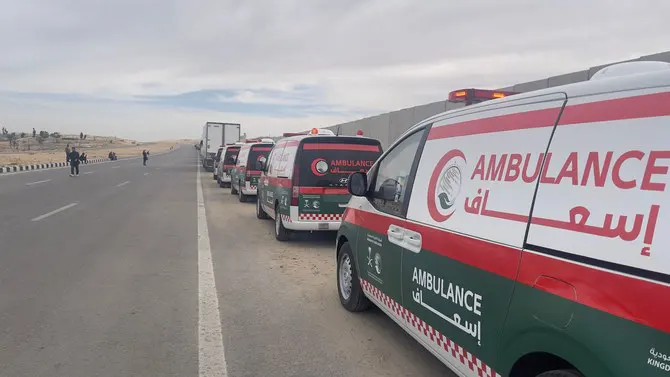Saudi specialists and officials led by the chief of KSrelief have launched the Kingdom’s first aid convoy from Egypt to Gaza.
Dr. Abdullah Al-Rabeeah, supervisor general of the King Salman Humanitarian Aid and Relief Center, along with Osama Nugali, Saudi ambassador to Egypt, a KSrelief team, and representatives from the Egyptian Red Crescent and the Palestine Red Crescent Society, gathered in Egypt on Wednesday to launch the aid through the Rafah crossing for delivery to Palestinians in the Gaza Strip.
Dr. Al-Rabeeah on Thursday signed a cooperation agreement with the Egyptian Red Crescent, the International Red Cross, UNRWA, the World Health Organization, and the World Food Programme at a total cost of $40 million.
The KSrelief chief inspected warehouses, examined the operation of the Saudi aid trucks and oversaw cooperation with the authorities responsible for delivering the aid to the enclave.
The Saudi aid effort was launched following a directive from King Salman and Crown Prince Mohammed bin Salman.
Al-Rabeeah told Arab News: “We are kicking off this campaign today as a gift and a small contribution to our brothers in Gaza. The convoy includes 30 aid trucks loaded with food, medicines and shelter supplies, in addition to 14 ambulances fully equipped with aid devices, respirators and oxygen, and everything needed by our brothers in Palestine.”
The Kingdom has also launched a 15-plane air bridge and a sea bridge, which will bring more aid and 20 ambulances, he added.
Al-Rabeeh said that KSrelief aims to save the lives of Palestinians in Gaza, with children and elderly in the enclave in urgent need of food and medicine.
The closure of the Rafah crossing by Israel had hindered the arrival of aid, he added. Nugali praised the coordination between KSrelief and the Egyptian Red Crescent, as well as the assistance provided by Egypt’s government.
He told Arab News: “I would like to thank the Egyptian government for its fruitful efforts to facilitate the tasks of KSrelief.
“We are not facing any challenges to deliver the aid, except the restrictions imposed by the Israeli side, which has led to only 50 trucks entering Gaza in one day despite hundreds of aid trucks awaiting permission. We hope that the cease-fire which started today will result in the entry of more aid awaited by our brothers in Gaza,” he added.
Al-Rabeeah and his delegation also visited the Rafah crossing and examined humanitarian opera-tions.
Arab News met a displaced Palestinian lawyer, Fatima Ashour, who fled from Gaza to Deir Al-Balah, then Khan Younis, before arriving in Egypt. She was forced to leave her brothers and sisters in Gaza.
Ashour warned that Gaza’s “tragic” situation included the spread of disease at UNRWA schools and a lack of water for bathing and cleaning, which had forced her to cut her hair.
The health situation in the enclave is “terrible,” she added, warning of a major food shortage. Many people, including her siblings, are unable to leave because they lack Palestinian passports, Ashour said.
Israel and Hamas on Wednesday agreed on a cease-fire in Gaza for at least four days.—Agencies










